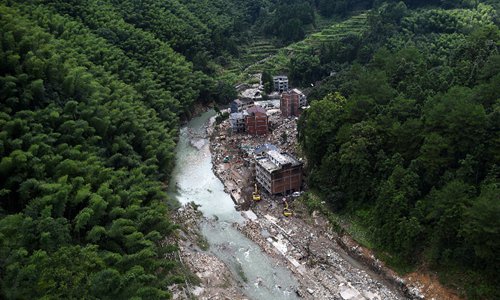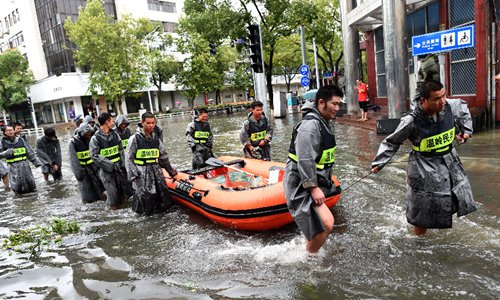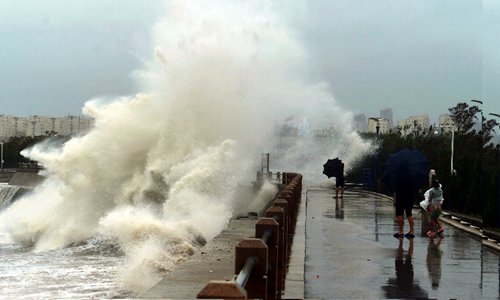HOME >> CHINA
China battles powerful Typhoon Lekima
Source:Xinhua Published: 2019/8/12 9:30:20

The site of the landslide on Aug. 11, 2019 in Shanzao Village of Yantan Township in Yongjia County, east China's Zhejiang Province. (Xinhua/Han Chuanhao)
Chinese authorities have mobilized dramatic rescue efforts after the powerful typhoon Lekima churned through the country's east coast starting from Saturday.
A total of 32 people died and 16 remain missing after Lekima, the ninth and strongest typhoon of the year, landed around 1:45 a.m. Saturday in the city of Wenling in eastern China's Zhejiang Province, the provincial flood control headquarters said.
Lekima packed winds of 187 kilometers per hour and brought heavy rainstorms. Zhejiang is often hit by typhoons in the summer, but Lekima is among top three strongest to have hit the province in history, weather experts said.
"Lekima is like a horse with an extremely fierce temper. It rakes in so much water as it forms off the ocean. Sustained downpours pushed a lot of rivers to very dangerous levels," said Luo Yuezhen, a top meteorologist with the Zhejiang weather service center.
In Zhejiang alone, more than 21,000 service personnel and militia members have been engaged in rescue and relief. They stacked sandbags, drained muddy water off the streets and rode on inflatable boats to evacuate residents who lived in the 1,600-year-old town of Linhai, where streets were completely submerged on Saturday.
Military rescue teams were called to the city of Taizhou in Zhejiang, where a large part of urban areas suffered power cuts, shortage of tap water and disruption of communication.
A total of 650 firefighters, soldiers, policemen and government agency staff are searching for nine people who are still missing in Shanzao village in Yongjia County. By Sunday, 23 people in the village have been confirmed dead after torrential downpours caused a landslide, blocked a river and submerged many homes.
"I heard a loud bang around 4 a.m. Saturday, and I climbed up to check and saw the first floor was already full of water. The water rose to the fourth floor in less than 10 minutes," said Pan Jianli, a resident.
"I was waiting for death and was so lucky to have been saved, but it's saddening to learn that so many of my folks have died," said Pan.

Staff members transport relief supplies via a rubber dinghy in Wenling, east China's Zhejiang Province, Aug. 10, 2019. (Xinhua/Han Chuanhao)
Xu Wenhai, a 59-year-old village official, was on his way back home when he saw the family of his neighbor trying to wade through knee-deep water and escape a crumbling house. He helped the children of his neighbors escape but did not have time to save the mother.
In Zhejiang, nearly 1.22 million people have been evacuated from their homes, and close to 5 million people were affected, said the provincial flood control headquarters.
The typhoon damaged more than 189,000 hectares of crops and 36,000 houses, and the direct economic losses reached 16.6 billion yuan (about 2.3 billion US dollars), the office said. PREPARING FOR SECOND LANDING

The waves beating against the bank in Qingdao, east China's Shandong Province on Aug. 11, 2019. (Photo by Wang Haibin/Xinhua)
Lekima is expected to make a second landing along the coastline in Shandong late Sunday, packing strong winds and heavy downpours, the National Meteorological Center warned.
Shandong air traffic management bureau said the typhoon will greatly affect traffic in local airports. A total of 47 flights have been adjusted.
The coastal city of Qingdao issued a red alert for heavy rain on Sunday. All tourist destinations have been closed to the public. In Qingdao, 127 trains and all long-distance bus service have been suspended.
Shandong provincial educational authorities banned schooling for all kindergartens, elementary and middle schools. More than 88,000 people in the province have been evacuated to safe places.
Lekima is expected to travel through Shandong and enter the Bohai Sea.
(Additional reporting by Wang Junlu, Xu Shunda, Wu Shuaishuai and Tang Tao in Zhejiang)
Posted in: SOCIETY